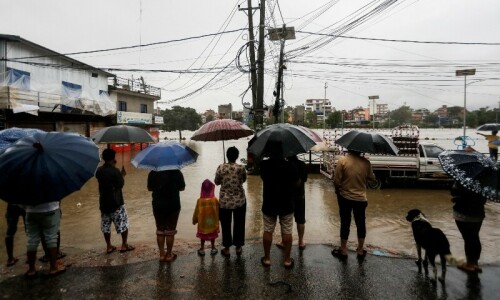THE monsoons are practically upon us, bringing with them the fear of urban flooding, flash floods, and accompanying devastation. Each time the Met Office issues a warning of ‘above normal rains’ or ‘vigorous monsoon activity’, the question of preparedness — or rather the lack of it — comes up: how well can Pakistan’s disaster management authorities and civic agencies cope and provide relief to the affected communities? Regrettably, our response to the increasing number of extreme weather events across the country has consistently fallen short. Successive governments have pledged to upgrade the urban infrastructure and enhance disaster management capacity to minimise the loss of life and property. But little has actually been done and the loss of lives as well as of public and private infrastructure continues year after year. It is not as if the authorities lack the plans or the money needed to ensure disaster preparedness. The problem lies in the poor execution of these plans and the injudicious utilisation of funds before and during the monsoons.
This year, too, the national and provincial disaster management authorities have ‘activated’ their emergency operations in anticipation of vigorous monsoon activity in the upper and central parts of the country during the current week. They have told the civic agencies to make sure they are ready to respond to any potential crisis. Will this year be any different from the past? Few believe so. Indeed, it is impossible for disaster mitigation efforts to keep pace with extreme weather events, which are becoming increasingly common due to global warming. Not even the developed countries can avoid all the havoc wreaked by excessive rains, storms and similar events. But many countries have been investing in and upgrading their urban infrastructure, as well as training and equipping civic agencies to provide immediate rescue and relief services. Regrettably in Pakistan, even large cities like Karachi and Lahore remain ill-prepared and ill-equipped to deal with unusual precipitation as the authorities remain in a state of slumber until a major disaster knocks on their door. With Pakistan among the countries most affected by climate change, there is no option but to be prepared. Pakistan cannot reverse climate change but it can prepare itself to protect its citizens and infrastructure from natural disasters such as the destructive floods of 2022 and earlier through better planning and execution.
Published in Dawn, July 3rd, 2024










































Dear visitor, the comments section is undergoing an overhaul and will return soon.